 An Open Letter to University Presidents
An Open Letter to University Presidents
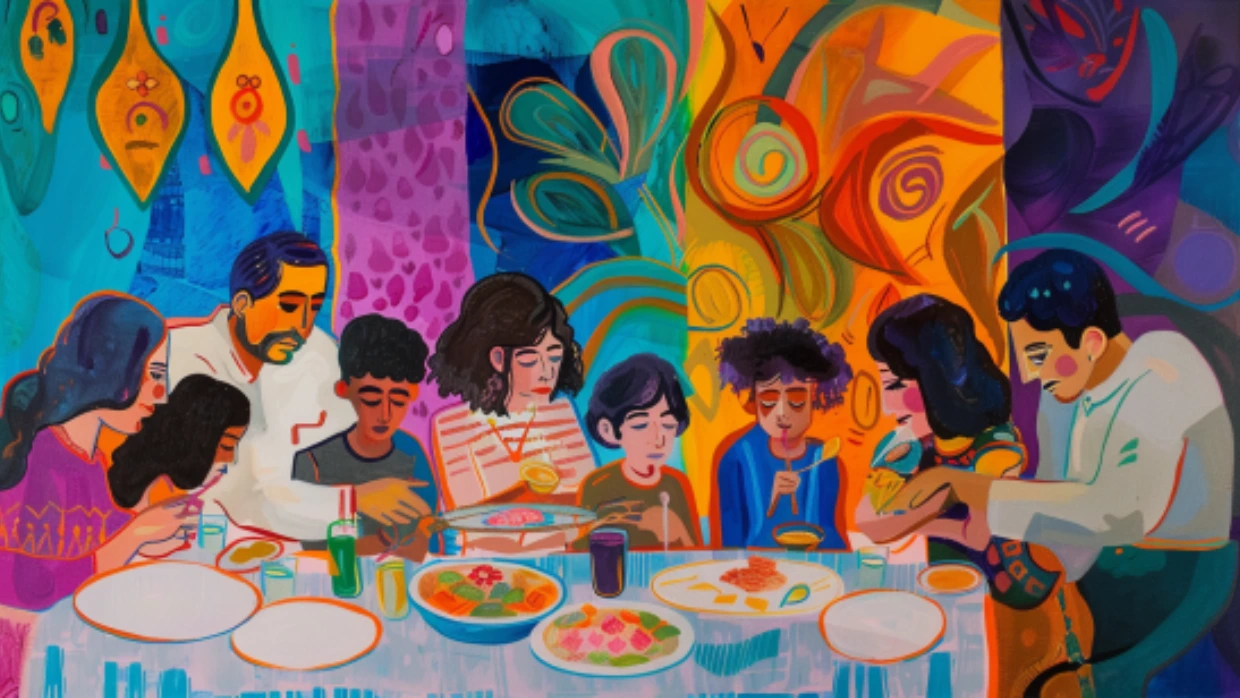

8 min read
These three fathers couldn’t find a Haggadah that answered their families’ needs, so they wrote their own.
These new Haggadah options will appeal to the American history buffs, people focused on personal growth, and Zionists.
When Covid shut down much of the world in the Spring of 2020, Jacob Kupietzy, a father of three kids in suburban Chicago, realized that for the first time, he and his family wouldn’t be able to attend Seders at his parents or his in-laws’ homes. “There was no one to lead our Seder but myself, with my wife Edy taking part.” Jacob was determined to create meaningful, memorable and fun Seders for his kids.
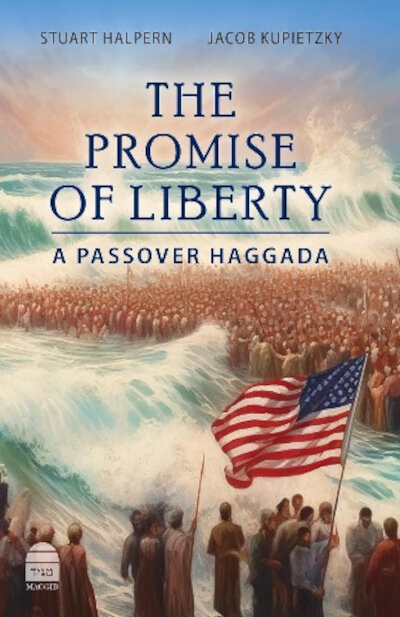
“I started thinking what it was that most resonates with my kids,” he explained in a recent Aish.com interview. With elementary school-aged and middle school children, “Hamilton was very big in our house,” he recalls. His kids loved the way the musical Hamilton “merged history and culture and got people excited about history again.” Jacob was determined to create a Passover Seder that got his kids as excited about Jewish history as they were about the American history they’d learned at school and through their favorite musical.
He and his wife realized that many stirring stories and documents about the long search for liberty in the United States - from seeking independence from Great Britain to abolitionist and civil rights - offer a beautiful way to talk about concepts such as servitude, deliverance, and liberty.
The Promise of Liberty: A Passover Haggadah contains both the complete Haggadah text, as well as excerpts from stirring speeches, stories, pictures and quotes drawn from American history, illustrating the Haggadah’s concepts. For instance, a discussion in the Haggadah of the ancient Israelites’ slavery in Egypt is accompanied by a description of the Underground Railroad in the United States and a picture of Harriet Tubman. The section in the Haggadah which discusses the fact that many nations and men have risen up to destroy the Jewish people is accompanied by a stirring speech delivered by President Harry S. Truman to Jewish men and women serving in the Armed Forces during World War II, who were battling yet another civilization bend on destroying the Jewish people.
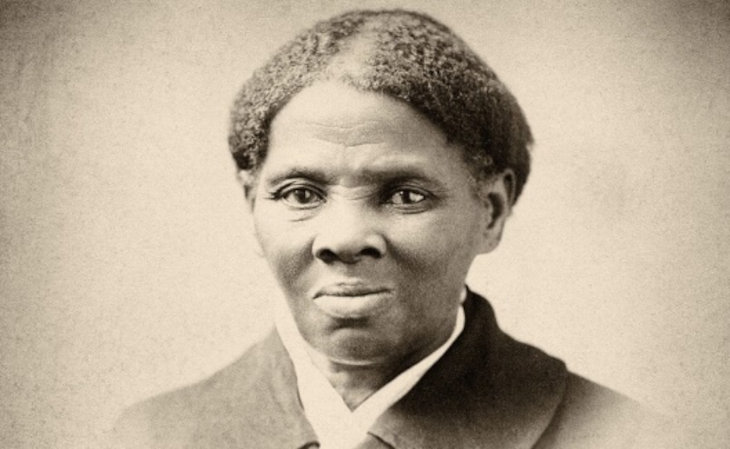 Harriet Tubman
Harriet Tubman
This Haggadah also traces the many ways that the Jewish exodus from Egypt has inspired American patriots through the years, from Negro spirituals which borrowed the language of the Haggadah in their dreaming of freedom, to Herman Melville’s citation of the Jews’ introducing “new values of justice and liberty to the world” as he championed greater human rights.
Soon after Jacob sent his manuscript to the publisher, Hamas’ brutal October 7 attack on Israel occurred. Jacob and his co-author, Rabbi Stuart Halpern, decided that all royalties from their new Haggadah will be donated to charity to promote greater education about Israel in schools around the world.
The Promise of Liberty: A Passover Haggadah by Stuart Halpern and Jacob Kupietzky is published by Maggid Books, and imprint of Koren Publishers Jerusalem Ltd. (2024).
Rabbi Doni Staum is a high school history teacher living north of New York City. With seven young kids, he’s used to answering a host of different questions each year at the Passover Seder. Now, he’s compiled a new Haggadah that answers many of the questions his students and own children have raised about Passover – as well as questions he remembers asking when he was a child himself.
“Everything in life is there to teach a lesson to you” Rabbi Staum explained. “The Passover Haggadah, in particular, is filled with episodes and reflections that can shape our understanding of the world and what it means to be Jewish.” Rabbi Staum collected many of the insights he’s shared through the years in a new Haggadah. In addition to containing the full traditional Haggadah text, The Striving Higher Haggadah contains lessons for living.
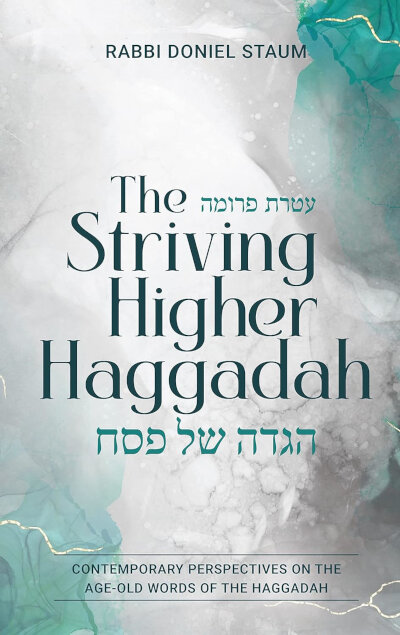
“I tried to take timeless, ageless ideas and give them a modern twist.” He wants readers to feel a close connection to the story of Passover. “This isn’t ancient history, it plays out in our lives every year.” He also points out that each year, we approach Passover in different circumstances. Covid made us see new lessons in the timeless words of the Haggadah. Now, with Israel at war, we again are approaching the Haggadah in a new way, with a vastly different perspective, this year.
One of Rabbi Staum’s many comments concerns marror, the bitter vegetable we dip into charoset during the Seder. Noting that “Marror symbolizes the challenges of pain and exile – and of life,” Rabbi Staum observes that it might seem surprising that the Haggadah contains a blessing to say over this bitter food with negative associations. He points out an uplifting way of looking at this curious fact: “We don’t whitewash our bitter past…We confront the reality of difficult times and recognize that they are inevitable. At the same time, we also seek to find the silver lining in all our struggles. We remind ourselves that everything God does is for the and for a Divine purpose. That may not take away the pain, but it certainly adds a dimension of sweetness to it.”
Essays at the back discuss even more aspects of Passover, with an inspirational twist. Speaking of the Spring season, when Passover falls, Rabbi Staum’s Haggadah observes: “A vegetable emerges from the ground as a new growth, a nutritious food emerging from the dirt of the earth. That is the symbol of Seder night. A new nation has emerged from the ashes and from nothingness. We have burst out onto the scene and are setting out to make our mark.”
The Striving Higher Haggadah: Contemporary Perspectives on the Age-Old Words of the Haggadah by Rabbi Doniel Staum is published by Mosaica Press, Los Angeles (2023).
Zionism is a core value for Marvin Chinitz, a semi-retired gastroenterologist, father, and proud grandpa living in suburban New York. For years, Marvin prided himself on leading Passover Seders which wove together inspiring stories and pieces of Jewish history. “Passover is a time to educate children,” Marvin recently recounted in an Aish.com interview. “I took this obligation very seriously.”
Marvin is now sharing his passion for Israel with the wider world. His new Haggadah, The Chinitz Zion Haggadah: How to Teach the Love of Israel at Your Seder contains both the traditional Haggadah text as well as a slew of inspirational stories about the central role that Israel and the Land of Israel has always occupied in Jewish history. “The Haggadah doesn’t only describe how God brought us out of Egypt,” Marvin explains; “it describes how God brought us out of Egypt and into the Promised Land.”
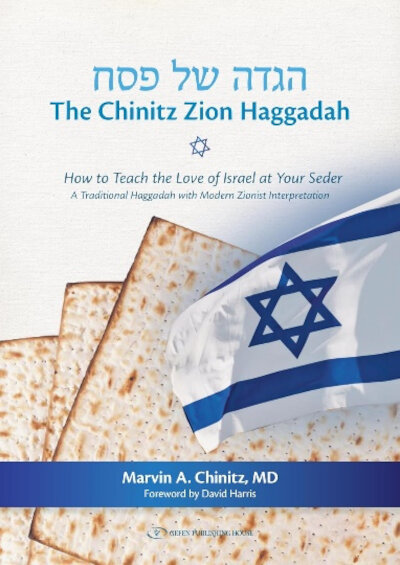
For example, accompanying his Haggadah’s discussion of our ancient ancestors’ servitude in Egypt, Marvin includes descriptions of modern-day Jewish communities who faced persecution in places such as Ethiopia, Yemen, and Iraq - as well as stirring descriptions of airlifts and immigration programs that the modern State of Israel launched to bring them to Israel. A comment section accompanying the Haggadah’s declaration “Whoever is hungry, let him come and eat” contains rousing true stories from the Holocaust and Israel’s War of Independence when Jews selflessly sacrificed themselves to help their fellow Jews.
A section of essays at the back includes informative discussions of the history of Zionism, the rise of the BDS movement, and information about modern-day Israel, including Palestinians and history and current state of the Arab-Israeli peace process.
According to Martin, Passover ought to be “the most prominent Zionist holiday in the Jewish calendar.” His new Haggadah is an effort to make that happen.
The Chinitz Zion Haggadah: How to Teach the Love of Israel at Your Seder (A Traditional Haggadah with Modern Zionist Interpretations) by Marvin Aaron Chinitz, MD, with a foreword by David Harris, is published by Gefen Publishing House, Jerusalem (2024).
The Passover Seder begins with disgrace - when we remember our slavery and captivity in Egypt - and ends with glory, as we recount our eventual exodus from Egypt. This year, with Israel at war and Israeli captives still being held by Hamas, it’s crucial we all feel this year’s Passover Seder fully. And may we likewise experience the “glory” at the end of the Seder with the release of the hostages and the threats to Israel vanquished.
